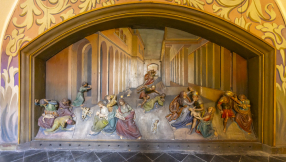
God's love for people knows no bounds. He knows every single person on earth, believing or unbelieving, and wants all men from all races and locations to be saved through the saving knowledge of Jesus Christ (see 1 Timothy 2:4).
One such person who saw this amazing nature and loving character of God is a man named Cornelius. He was no Israelite, and neither was he part of any fellowship of believers. Yet what he did and what God did for him was amazing. Who is he and what can we learn from him?
Let's talk about that.
Who is Cornelius?
Cornelius was a centurion of what is called the Italian Regiment. Though he was a Gentile, he was clearly "a devout man and one who feared God with all his household, who gave alms generously to the people, and prayed to God always." (Acts 10:2)
As a Gentile, he would be despised by the Jews. As a God-fearing person, however, he was remarkable. He was not an Israelite, but he feared the God of Israel. He did what was right in God's eyes - fear Him, give to the poor, pray always - despite the Bible's silence on whether he went to church or a synagogue, or not.
What can we learn from him?
Cornelius presents to us various lessons on faith and the fear of God. Here are a few:
1) The fear of God is more important than membership in any church
Cornelius wasn't a Jew, and for sure he wasn't part of any clergy of some kind for he was a Roman centurion. Yet he feared God, and that's what mattered.
Peter's very preaching in Acts 10:34-43 says this to be true:
"In truth I perceive that God shows no partiality. But in every nation whoever fears Him and works righteousness is accepted by Him." (see Acts 10:34-35)
2) His lack of knowledge about God caused him to misdirect his worship
Though Cornelius feared God in his heart and mind, he lacked knowledge of God. This is proven true in Acts 10:25, which says:
"As Peter was coming in, Cornelius met him and fell down at his feet and worshiped him."
Many Christians today come to church and accept Christ, only to stay immature and lacking in Biblical knowledge. Instead of worshiping God alone, they end up honoring ministers or other people in their lives way too much. Instead of pleasing God, they try so hard to please people, please family members, please friends, thinking that "honoring the man of God" equals honoring God.
Peter tells Cornelius where he needs to direct his worship:
"But Peter lifted him up, saying, "Stand up; I myself am also a man."" (Acts 10:26)
This brings a two-fold lesson for us. As God's people, we ought to worship and idolize no one but God alone. Ministers or shepherds of the flock, on the other hand, ought to teach the people to do that, and not receive worship as well.
3) He brought his whole family to God
Cornelius is introduced to us as "one who feared God with all his household" (see Acts 10:2). When God told him to call for Peter, he waited eagerly along with "his relatives and close friends" (see Acts 10:24). And when it came to hearing God's word, he wasn't selfish either. He told Peter,
"Now therefore, we are all present before God, to hear all the things commanded you by God" (see Acts 10:33)
Cornelius was a man whose faith and fear in God wasn't kept in the closet. He wasn't ashamed to fear God in the sight of his household. When an opportunity to hear a message from God came to him, he didn't act as if he was a "special" man "chosen" to hear a "special message from God." No, he didn't do that.
He shared his faith with his family, influenced his relatives to fear God, and invited even his close friends to hear a message from God, something he hasn't even heard yet. His faith in God spread like wildfire to his closest and most intimate interactions.
We ought to be like that. We ought to desire to see our families saved and rejoicing in the truth of Christ. We ought not to keep the love of God to ourselves but share it to our families and closest friends, too. We're commanded to do that. Moreover, it should be our joy to do that.













